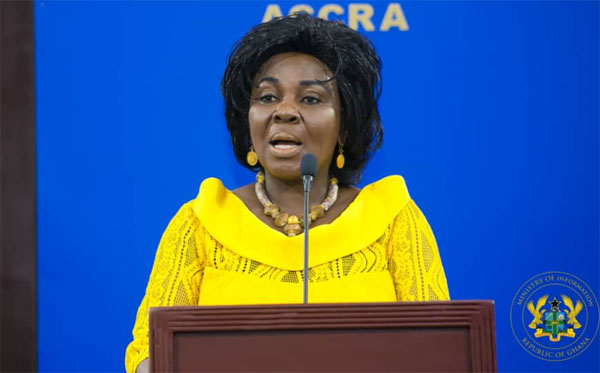Cecilia Abena Dapaah
One of the most stimulating presentations made by a member of Nana Akufo-Addo’s government occurred when the Minister of Sanitation and Water Resources, Mrs. Cecilia Abena Dapaah, appeared before the media at the Ministry of Information on 23 April 2019.
She spoke like a true apostle of sanitation. She used plain, unvarnished everyday language when she was describing how some Ghanaians “shit anywhere.”
She made members of her audience wince instinctively when she described the piles of waste matter that had accumulated in Ghana, dating back many years, that she was determined not only to remove but turn into economically useful products.
The question, though, is this: will she be able to translate her inspiring words into action, in a country which has been often told of great programmes for social advancement, but few of which have actually been implemented?
Mrs. Dapaah gave the impression that she was determined to implement her ideas. For, as she said in Twi (so that most Ghanaians could not fail to understand her) our approach to hygiene generally and sanitation in particular, “mmfata yen!” (does not befit us at all!)
Now, to say that something does not “fata” a person presupposes that that person is inherently endowed with “standards” of behaviour, far above the performance he or she was currently putting up. It is a loaded term, for while it reproaches a person for indulging in a particularly undesirable line of action, it seeks to inspire him or her to do better next time!
Mrs. Dapaah began by acknowledging the “undisputed fact that access to safe water and improved sanitation is considered key to the socio-economic development of every civilized society.”
Sanitation, she pointed out, was “among the powerful drivers of the national economy which impacts on health, education, tourism and human development.”
She disclosed that according to a study by the Water and Sanitation Programme of the World Bank, “poor sanitation costs Ghana USD 290 million annually.
Personally, I think the World Bank has understated the economic cost of the insanitary conditions we find in Ghana. From malaria to gastro-enteritis; from cholera to typhoid – name any of the common diseases that send our people trooping to hospitals and clinics, and you can trace its origin to the insanitary conditions that a lot of our fellow citizens are forced to live under.
Therefore, in terms of lost economic output (caused by people being unable to go to work or work at full capacity) and, of course, also taking into consideration, the cost providing medical and paramedical attention plus the cost of medication, the price the nation pays for our insanitary conditions is far above the World Bank estimate.
Be that as it may, Cecilia Dapaah does not mince words about what she intends to do:
It makes economic sense to invest in sanitation; (she said). “Every Dollar invested in sanitation yields USD 5 dividends.”
She, however, aroused my sensed of scepticism when she stated that “according to the 2019 report released by the Ministry of Monitoring and Evaluation, “75% of the solid waste generated in the urban centres” is now “properly managed.”
I don’t believe that. How did the Ministry of Monitoring and Evaluation come by this figurer? Our own eyes can see that the urban centres are still shamefully dirty, though an effort IS being made to improve matters.
The strategies and measures adopted by Mrs. Dapaah’s ministry to improve on the sanitation situation are “guided by the vision of H.E. The President, Nana Addo Dankwa Akufo-Addo, of making Accra ‘the cleanest city in Africa’, Mrs. Dapaah affirmed. This vision was being “vigorously and vehemently” pursued by the ministry, in collaboration with the metropolitan, municipal and district assemblies (MMDAs), the private service providers and the other stakeholders.
This is where the trouble lies. How can the ministry ensure that the local authorities, in particular, play their full part in waste management, for example? The impression people get from the behaviour of members of municipal and district assemblies is that they spend most of their time worrying about how to get themselves elected to become MPs and even ministers, not about how to achieve lofty objectives like brightening the corner where they are. If the ministry could whip them into action, we would all praise it to the high heavens.
One thing the minister said that brought me hope was her promise that the Ministry would facilitate “the deployment of sanitation guards, popularly known as ‘saman-saman’, by July 2019.
When I was growing up, these ‘saman-saman’ or ‘tankaase’ (as we knew them in the colonial days) ensured that all villagers observed good sanitation practices. Apart from inspecting the streets and gutters and the ‘boilers’ (or suminaso) they made sure that our streams segregated into areas for washing/bathing and for fetching drinking water. They even invaded people’s kitchens and looked inside their water-pots. And they tested the containers of harvested rain-water (barrels, drums and kerosene tins) had been adequately cleaned.
The minister also made hopeful noises about the problem of landfills. Ghana can boast of only four public engineered landfill facilities, she acknowledged. She announced that as part of measures to “overhaul the waste management infrastructure regime in Ghana, extensive engagement with prospective local and foreign investors” was being canvassed “to transform the existing poorly-managed landfill facilities. “
She also said that the ministry was pursuing the development of more sustainable waste treatment options, including a waste-to-energy, composting and recycling system, starting from Kpone and Kumasi.
It is, therefore, to be hoped that the minister to be able to transform her ministry’s plans into concrete achievements. If she succeeds, Ghana can hold her head high as a relatively clean country, proudly at the forefront, not only in Africa but in the world. So let’s us all give her our full support. Certainly, she is going about the job in the right spirit.
www.cameronduodu.com
By CAMERON DUODU


